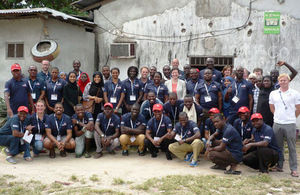African nations unite for lifesaving training to tackle drowning epidemic
Lifesavers and swimming experts from 14 African countries, united with the shared goal of saving lives from drowning, have travelled to Zanzibar where they will today (22 September) begin two weeks of intensive training with the Royal National Lifeboat Institution (RNLI).

RNLI Candidates with Mrs. Penelope Smith, Deputy British High Commissioner to Tanzania
Deputy British High Commissioner, Mrs Penny Smith attended the closing sessions of a UK initiative through the RNLI to save lives.
The African continent has the highest drowning rate in the world, largely due to limited lifesaving services and swimming skills, and a high exposure to open water.
Over the next two weeks, 30 trainees from countries across Africa – including Botswana, Cameroon, Gambia, Ghana, Kenya, Lesotho, Mauritius, Mozambique, Senegal, Sudan, South Africa, Tanzania, Togo and Uganda – will learn from six RNLI trainers how to run lifesaving services in their home countries.
The course, Future Leaders in Lifesaving, is the only one of its kind, designed and delivered by the RNLI specifically to train and develop lifesavers in countries where drowning is a major cause of death.
The course is split into three core areas: operations, leadership and aquatic survival. The operations and leadership phases will cover everything from hands-on lifesaving skills, setting up a lifeguard service and training new recruits, to strategies for building and sustaining a lifesaving service, and how to manage people.
In the third phase of the course, the candidates will learn about the Aquatic Survival Programme – a course which teaches water safety and survival swimming to children. The RNLI has trialled this course in Zanzibar, by training local teachers and community leaders to deliver these important lessons to such a vulnerable group. The candidates on the Future Leaders in Lifesaving course will learn how to implement the Aquatic Survival Programme back in their home countries, to help ensure the safety of thousands of African children around water.
Steve Wills, the RNLI’s international development manager, says: ‘A staggering 400,000 people drown worldwide each year, with a vast proportion of those being in Africa, which has the highest continental drowning rate in the world. The tragedy of the situation is that drowning is completely preventable – with better lifesaving services and swim-survival skills, lives can be saved.
‘The Future Leaders in Lifesaving course has the potential to make a huge impact in Africa. It will teach a group of very proactive candidates everything they need to know to lay the foundations of very strong and effective lifesaving services, and also establish a programme of vital water safety education for children back in their home countries.
‘The course is tailored to help them apply their learning to their specific environments. Importantly, a key advantage of gathering a big group like this is that they can share ideas and experiences, and learn from each other during the two weeks.’
The Future Leaders in Lifesaving course forms part of the RNLI’s broader international development work, in which the charity is establishing lifesaving programmes and seeking to build a coalition to tackle the global drowning epidemic.
The project benefits from the support of the Princess Charlene of Monaco Foundation,, which works across the world to raise awareness of the dangers of water and the importance of teaching children to swim.
The programme is also supported by Royal Life Saving Society Commonwealth, with a member of their team helping to deliver the course alongside the RNLI.
Notes to Editors
-
The RNLI Future Leaders course is running in Zanzibar from 22 September to 4 October 2014.
-
The World Health Organization (WHO) estimates 400,000 people drown worldwide each year.
-
Click here to view a film about the RNLI’s international development work.
-
RNLI spokespeople are available for interview. Please contact RNLI Public Relations to arrange interviews.
RNLI media contacts
For more information, contact Laura Fennimore, RNLI Public Relations Officer, on 01202 663181 or Laura_Fennimore@rnli.org.uk or the RNLI Press Office on 01202 336789.
RNLI online
For more information on the RNLI please visit RNLI. News releases and other media resources, including RSS feeds, downloadable photos and video, are available at the RNLI Press Centre
Key facts about the RNLI
The RNLI charity saves lives at sea. Its volunteers provide a 24-hour search and rescue service around the United Kingdom and Republic of Ireland. The RNLI operates 237 lifeboat stations and has 200 lifeguard units on beaches around the UK. The RNLI is independent of Coastguard and government and depends on voluntary donations and legacies to maintain its rescue service. Since the RNLI was founded in 1824 its lifeboat crews and lifeguards have saved over 140,000 lives.
A charity registered in England and Wales (209603) and Scotland (SC037736). Charity number CHY 2678 in the Republic of Ireland.